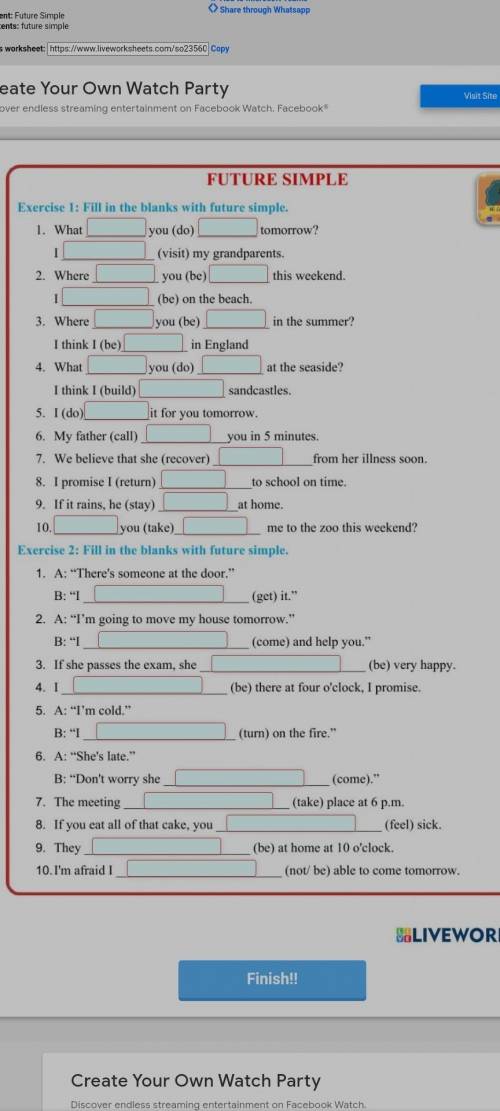Exercise It Fill in the blanks with future simple. Jyou (do) (visit) my grandparents. 1. What tomorrow? 2. Where you (be) |this weekend. I. (be) on the beach. 3. Where Jyou (be) in the summer? I think I (be) in England 4. What Jyou (do) at the seaside? I think I (build) sandcastles. 5. 1 (do) lit for you tomorrow, 6. My father (call) you in 5 minutes, 7. We believe that she (recover) from her illness soon. 8. I promise I (return) 9. If it rains, he (stay) to school on time. . at home. 10. lyou (take) me to the zoo this weekend? Exercise 2: Fill in the blanks with future simple. 1. A: "There's someone at the door." B: "I (get) it." 2. A: "I'm going to move my house tomorrow." B: "I (come) and help you," 3. If she passes the exam, she (be) very happy. (be) there at four o'clock, I promise. 4. I 5. A: "I'm cold." B: "I (turn) on the fire." 6. A: "She's late." B: "Don't worry she (come)." 7. The meeting (take) place at 6 p.m. 8. If you eat all of that cake, you (feel) sick. 9. They (be) at home at 10 o'clock. 10. I'm afraid I (not/ be) able to come tomorrow.

Другие вопросы по теме Английский язык
Популярные вопросы
- Альпинист поднялся на высоту 2км определите мех работу при массе альпиниста...
2 - Кто представляет интересы государства в судебном процессе...
1 - Где здесь доклад по теме природные сообщество...
3 - Сколько грамм серной кислоьы потребуется для взаимодействия с 36г оксида...
2 - Сократите дроби 1)12n^2/24mn^2+42n 2)40cd^2-10d/25d^2 3)9n^2/9mn^2+6n...
1 - Написать сказку на тему грибы поразиты...
2 - Что модно определить по правилу буравчика...
1 - 50 ! наука и техника в 20-21 веке. особенности развития научно-технического...
1 - 6. назовите правильное расположение широтной зональности: а) арктическая...
3 - Автотрофные организмы, составляющие перво звено пищевой цепи...
2
1. What will you do tomorrow?
In this sentence, the word "will" is used to indicate future simple tense. So the correct form of the verb "do" should be "will do".
2. Where will you be this weekend?
Again, "will" is used to indicate future simple tense. So the correct form of the verb "be" should be "will be".
3. Where will you be in the summer? I think I will be in England.
Here, both sentences use future simple tense. The question asks about a future location, and the answer states a belief or prediction. "Will" is used in both cases.
4. What will you do at the seaside? I think I will build sandcastles.
Both sentences use future simple tense. The question asks about future actions, and the answer states a belief or prediction. "Will" is used in both cases.
5. I will do it for you tomorrow.
Here, "will" is used to indicate future simple tense. The sentence states a promise or intention.
6. My father will call you in 5 minutes.
This sentence also uses future simple tense. It states a future action that will happen in 5 minutes.
7. We believe that she will recover from her illness soon.
Again, future simple tense is used here. The sentence expresses a belief or prediction about a future event, which is the recovery from an illness.
8. I promise I will return.
Here, "will" is used to indicate future simple tense. The sentence states a promise to do something in the future.
9. If it rains, he will not be able to come to school on time.
This sentence uses future simple tense in the conditional form. It states a possibility of a future event (rain) and its consequence (late arrival to school).
10. Will you take me to the zoo this weekend?
This question uses future simple tense to ask about a future action.
Exercise 2:
1. A: "There's someone at the door." B: "I will get it."
The verb "will" is used in the response to indicate future simple tense. It states the intention to perform the action of getting the door.
2. A: "I'm going to move my house tomorrow." B: "I will come and help you."
Here, "will" is used to show the intention to come and help in the future.
3. If she passes the exam, she will be very happy.
The sentence uses future simple tense in the conditional form. It states a possibility of passing the exam and its consequence (happiness).
4. I will be there at four o'clock, I promise.
Here, "will" is used to indicate future simple tense. The sentence states a promise to be at a specific location at a specific time in the future.
5. A: "I'm cold." B: "I will turn on the fire."
The verb "will" is used in the response to indicate the intention to perform the future action of turning on the fire.
6. A: "She's late." B: "Don't worry, she will come."
Here, "will" is used to express the belief or prediction that the person who is late will come in the future.
7. The meeting will take place at 6 p.m.
The sentence uses future simple tense to state the time at which the meeting will happen.
8. If you eat all of that cake, you will feel sick.
This sentence uses future simple tense in the conditional form. It states a consequence (feeling sick) that may happen in the future if all the cake is eaten.
9. They will be at home at 10 o'clock.
Here, "will" is used to indicate future simple tense. The sentence states the location of "they" at a specific time in the future.
10. I'm afraid I will not be able to come tomorrow.
The verb "will" is used to indicate future simple tense in the negative form. The sentence states an inability to come in the future.
Please note that the correct spellings of "I" and "you" have been used in the answers for clarity.